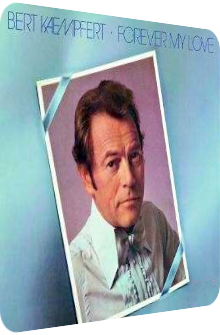
Bert Kaempfert
Forever My Love
1975
One look at the title – and the interest of the Exotica fan wanes. But wait, Forever My Love by German composer and orchestra leader Bert Kaempfert (1923–1980) has not washed ashore on the coastline of AmbientExotica out of the blue! This 12-track LP, recorded in Hamburg and released in 1975 on the Polydor label, may be severely outshone by Kaempfert’s late yet genuine Exotica opus Tropical Sunrise (1977), but once this tendency is accepted as a given, one might as well enjoy the exotic traces and places on this predecessor. And delight we shall receive! The album seems to evoke one of those deeply passionate romantic evenings akin to Jackie Gleason’s records à la The Torch With The Blue Flame (1957) or Nelson Riddle’s slightly brighter Love Tide (1961), but Kaempfert’s orchestra sails around those rocky cliffs by placing exotified tone sequence in the arrangements which are otherwise pretty normal and even big band-resemblant: silky brass layers, Space-Age strings and dreamy flutes make up the vast majority of the table of contents which, I might add, features 50% unique material written by Kaempfert and longterm collaborator and violinist Herbert Rehbein.
Heck, there are even a choir and two Exotica tunes on board! The album is indeed a largely symphonic work, but for a change, Polydor spills the beans and mentions the names of the four soloists whose prestidigitation skills appear time and again. Said Herbert Rehbein plays the violin, Ack Van Rooyen delivers tones on the trumpet and flügelhorn, Herb Geller is the flutist whereas Jiggs Whigham plays the trombone. Here is a closer look at a work Exotica fans never got to know due to the title and the tasteless front artworks of the various reissues. Once you made it this far in the review, you might as well see what this work offers in-depth, so let’s take a closer look at the moonlight-illuminated balconies in paradise.
Starting the album with an Exotica hybrid, Joe Burke’s and Edgar Leslie’s Moon Over Miami is torn between tropical vistas and commonplace sceneries, depending on where the respective listener is situated. Miami was nonetheless an enchanting place years before its flavor was to be narrowed down to a synthesizer-fueled Crime Pop car chase extravaganza in the 80’s. Kaempfert opens his rendition with Ack Van Rooyen’s gorgeously quavering flügelhorn which then meets glitzy-thunderous string flashes whose coruscating glissando illumines the night in tandem with brass eruptions. Van Rooyen changes to the lead trumpet and then meets an acoustic guitar-accentuated base frame. The arrangement oscillates between solo incarnations, a title-humming mixed choir and euphoric eruptions. Its downtempo pace prevents this piece from being linked to a mere big band setting, and the strongly histrionic but excellently harmonious horn helixes at the end only fuel this notion.
It is a superb opener whose kitsch can indeed be embraced, unlike the follow-up Reggae Romp, an original Kaempfert concoction whose title is strikingly de trop. There is anything Reggae-like injected into this mellifluously swinging piece which comprises of a flügelhorn/trombone duet between Ack Van Rooyen and Jiggs Whigham, with Herb Geller joining the fun on his flute. A female Space-Age “la la la” underbrush as well as cheeky piano prongs round off a tune that could have been easily featured on Kaempfert’s best known album Swingin’ Safari (1962). On the plus side, it is completely detached from the love theme.
Georges Boulanger’s and Jimmy Kennedy’s My Prayer follows, an enchanting piece of ephemeral melodrama. Gyrating around a choir-backed lethargy, a smarmy performance of Herbert Rehbein on his gypsy fiddle and dun string washes, the heaviness and Baroque vestiges make this the let-down of side A. Here, “A” stands for avoid. However, all is not lost: the following Cry Baby Cry is a delightfully bucolic swinging piece co-written by Kaempfert and Rehbein. The big band brass sections are wondrously silkened, each note is mellow and catchy, the acoustic guitar riverbed meets double bass backings and Ack Van Rooyen's trumpet spirals. Carefully rounded off by a string thicket in the background, Cry Baby Cry evokes a neon-lit insouciance which simply works and convinces big time.
On The Sunny Side Of The Street follows. Originally written by Dorothy Fields and Jimmy McHugh, it is another nocturnal (!) gem which seamlessly injects the uplifting dreaminess of Cry Baby Cry into this tune as well. Mildly swinging but with cautiously incisive brass coils as well as double bass billows, carefreeness reigns once more, an emotion to be utterly neglected in the last track of side A, Nino Rota’s second part off the Theme From Godfather. Hued in twilight, drifting between harp-accentuated and choir-accompanied trumpet melodies by Van Rooyen and an explosive crescendo in the latter half, this unsurprisingly cinematic piece is not entirely out of place, but concentrates strongly on a lovestoned devotion of the dangerous kind. Exotic it is not.
Side B is an auspicious one, if only for the fact that two regular Exotica quasi-standards are on board, with the opener Perdido by Ervin Drake, H. J. Lengsfelder and Juan Tizol being the first and jazziest one. The double bass waves twirl up and down, Herb Geller’s flute shuttles gleefully in-between the piano blebs and joyous brass strata. Not necessarily exotic per se, the tone sequences are magnificently lofty and mirthful. The eponymous Forever My Love is another Kaempfert/Rehbein production and moves from ecclesiastic organ-oid brass washes over glorifying flügelhorn complexions complete with string mirages to a warmhearted nostalgia, but there is no mistake: this one is a camouflaged appellation for a mating ritual. Hm.
The second Exotica song breaks that rose-tinted spell, for it is Nacio Herb Brown’s and Arthur Freed’s gold standard called Pagan Love Song. And fantastic it is indeed, intertwining the archetypically warped Hawaiian glissando on the guitar chords, superb susurrations by the mixed choir and muted trumpet tones by Van Rooyen. Everything feels streamlined and magical, as if viewed through a translucent veil. But the trick works, Pagan Love Song is the best form of Easy Listening! While the following Walkin’ And Shoutin’ by Bert Kaempfert is a bog-standard midtempo big band brute with tumbling trumpets and electrifying horn echoes, Herbert Rehbein’s I Love You So is a much more romantic but superbly and next to cliché-free theme of devotion. String nebulae, catchy overtones and a title-humming mixed choir create one of these velvet love anthems which – as the adage goes – “they don’t create anymore.” Bert Kaempfert’s final Soft Shoulders is an absurdly pointillistic upbeat ditty with vesiculating brass flecks, a humming Space-Age choir of females and golden-shimmering sun-dried Balearic guitar accompaniments. The album is rounded off in that Mediterranean style Kaempfert is known for.
Well, look at that, hear hear, Forever My Love is not the dull lovescape than one might imagine by the look of things. It is a fully fleshed out Exotica record with a focus on mellifluously frilly brass layers and swinging rhythm aortas. While I would have applauded just a tad more bongo or conga layers, I am nonetheless pleased with the overall atmosphere. Here, Kaempfert and cohorts do many things much better than on the majority of their albums. The prime example in this regard is the use of the acoustic guitar. Where it sounds – expectedly yet unnervingly – Latinized and melodramatic on albums like That Latin Feeling (1963) or My Way Of Life (1968), here the tonality is simply right, even more so when one considers how risky it is to put sun-dappled guitar strumming in an otherwise wondrously moonlit album full of evening strings and ashen yellowed brass washes. But there is no complaint, its inclusion on approximately half of the album’s material works well.
Then of course there is the mixed choir which has always been the Achilles’ heel of Kaempfert’s and Rehbein’s productions, even though a choir is usually a sign for a big budget. Previously though, the choir is either mixed way too low or sings in a syrupy timbre that decreases an arrangement’s level of enchantment. This album breaks the trend, and decidedly so: Space-Age hums, bachelor pad "da da da" jots and onomatopoeic chants add a lofty sub-theme to a love-focused album. All these things plus the euphonious tone sequences make Forever My Love a languorous half-Exotica artifact that will never be considered due to its title and composer, but can thoroughly enjoyed by fans of nocturnal songs. Renditions like Moon Over Miami, and Pagan Love Song or Kaempfert’s own Cry Baby Cry are shining examples, with the effervescent finale Soft Shoulders showing in glaring clarity the only thing that is wrong about the project’s scope, and that is the incompatibility of the titles with the actual atmosphere of the composition. Don’t you be fooled by that! Forever My Love is available on vinyl, a reissued CD and as a digital download on iTunes, Amazon MP3 and the likes.
Exotica Review 415: Bert Kaempfert – Forever My Love (1975). Originally published on Feb. 14, 2015 at AmbientExotica.com.
